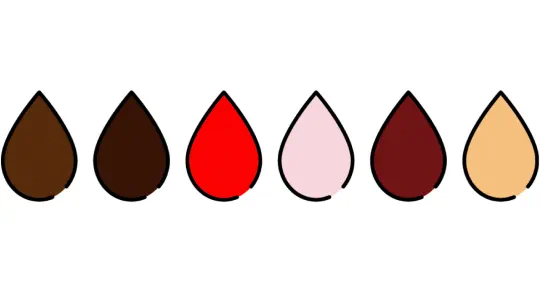Understanding period blood colour
Your period colour can highlight possible health concerns, which makes understanding it important
Period blood colour: What does it mean?
If you’ve noticed a change in your period blood colour, you may be wondering whether it’s a cause for concern. We asked Dr Samantha Wild, Clinical
Lead for Women’s Health at Bupa Health Clinics, to answer some of your questions about periods. Join us as she takes us through a handy period colour
chart.

What's a normal period blood colour?
Normal period blood can be red, pink, brown or black. The colour of your period blood can depend on how heavy your flow is, where you are in your cycle and how long the blood has been in your body for.
Period blood colour alone isn’t enough to say whether a period is 'normal’. If you’re experiencing symptoms like pain, spotting, itching or an irregular odour, please book an appointment with a health professional.
Don't worry, you're not alone
Our research shows that lots of us turn to Google to check whether we need to be worried about periods.
In the last year, searches have increased significantly:
Period blood chart
Searches tripled
Coloured discharge before period
Searches doubled
Period blood colour meaning
Searches doubled
Research taken from Google Keyword Planner, UK average monthly search volumes December 2023 to November 2024.
Period colour chart
Many factors can affect the colour of your period, including infections, your age and hormones. We’ve pulled together this handy guide to help you understand what your period colour could mean. You should always report any changes in your period to a health professional.


Brown period blood
If your period blood is a brown colour, it’s usually nothing to be concerned about. Brown blood has been outside of your blood vessels for a longer time. When blood comes into contact with air, it oxidises and turns brown.
If you find that your period blood is brown frequently, it may mean that your womb shedding rate is on the slower side. Or, it could even be the last bit of womb tissue discharging from a previous cycle. Again, it’s not usually anything to worry about, but if you are concerned, have a chat with your GP.

Black period blood
Though black blood might look alarming, it’s actually another sign of older blood making its way through your body. It s usually nothing to worry about.
Sometimes, it might also have a different consistency lumpy, like coffee grounds. This shows your period was probably late and on the acidic side again, it’s usually nothing to worry about.

Bright red period blood
In lots of instances, your period blood will be bright red at the start of your period. This is because your uterus muscles are contracting to quickly shed your womb lining.
If you find that your flow is very heavy and bright red, it could be a sign of other concerns like fibroids, polyps and ovarian cysts. If your period is regularly heavy or painful, don’t suffer alone. Book an appointment to see your GP.

Pink period blood
Pink discharge right before your period is completely normal - it shows that your period’s on its way, as blood mixes with your cervical mucus.
However, pink discharge between periods is something you should always report to a GP. Pink, watery discharge may be a sign of cervical cancer, so it needs to be looked at.

Dark red period blood
You may notice your period changes from bright red to dark red in colour after the first few days of your period this is completely normal. At the start of your period, your womb lining sheds quickly, but then slows down. Darker blood usually shows that the blood you’re shedding is no longer as fresh, and it’s been in your body for a little longer.
Sometimes, a darker red period can indicate that your body is preparing for pregnancy, or it could be a sign of miscarriage. If you experience dark red bleeding between periods, you should speak to your GP.

Orange period blood
Orange period blood, along with itching, strong smells or discomfort from the vaginal region, may be a sign of infection. You should book an appointment with your GP to check whether you need treatment.
Other times, if the colour is your only symptom, it’s likely that orange fluid is another indication that your period is on its way.

Grey period blood
If your period blood is grey or off-white, you should book an appointment to see your GP, especially if you’re pregnant as it could be a sign of miscarriage. Grey colouring could also signal an infection such as bacterial vaginosis.
Should I track my period?
Keeping a period diary (PDF, 1.3MB) can be a great way to spot patterns and symptoms associated with your period. For example, taking note of:
- Period length
- Period blood colour
- Heaviness of flow
- Period regularity
- Symptoms throughout your month
- Physical and mental wellbeing
Keeping a record can help both you and a health professional understand your period health better. It can highlight any areas for concern or even improve how you feel around your period.

When should I see a doctor about my period?
If your period is disrupting your ability to live well, Bupa’s Period Plan is there to help those struggling with managing their periods.
- If you pass blood clots the size of a 10p coin
- If you bleed for longer than a week
- If your period blood is grey
- If your mood is severely impacted during your period
- If cramps, bloating and headaches around your period are debilitating
- If you have bleeding between periods, or your periods are irregular
- If your period is heavy meaning you need to use more than one product at a time, you bleed through clothing, or change your sanitary products every few hours, or empty your menstrual cup more frequently than is recommended
- If your period blood is pink or orange, alongside other symptoms like vaginal itching and an unusual smell
Related content

Painful periods
(dysmenorrhoea)
We understand that painful periods can be debilitating. Learn more about possible causes, getting a diagnosis and the treatment options available to you.

Heavy periods (menorrhagia)
Heavy periods can interrupt everyday life. Hear from our experts about possible causes, treatment and diagnosis, and when to seek help.

Coping with painful or heavy periods
Heavy, painful, or irregular periods can be disruptive both physically and mentally. But you don’t have to face these problems alone.


